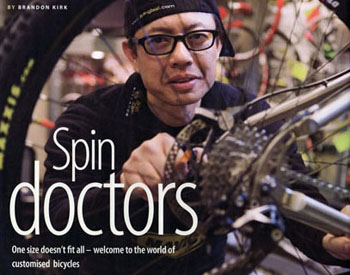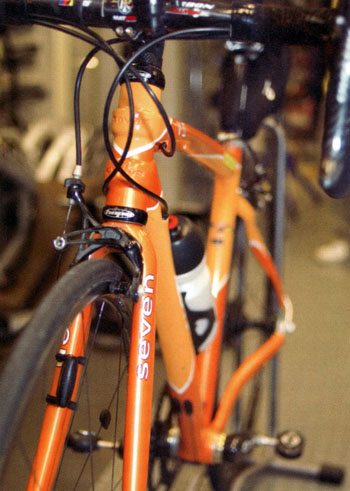Press Archive



The Club—Quarter One 2009
Spin Doctors
One size doesn't fit all—welcome to the world of customized bicycles
—by Brandon Kirk
In the world of cycling, bike-makers have long favoured a one-size-fits-all approach. Like the Model T Ford that came in any color as long as it was black, it is much cheaper to to produce bikes in standard sizes and finish. For most people, buying a bike off the shelf is just fine—a few adjustments to parts here and there, and a small, medium or large frame will fit just about everyone. But as with a piece of clothing there are some people who want, or perhaps need, a more tailored fit, whether for an uncommon body type or for having the pleasure of having a bike that is perfectly suited to the rider. Welcome to the world of custom bicycles.
Custom-bike buyers range from endurance riders and weekend mountain bikers to triathletes, and cycling enthusiasts have come to appreciate the enhanced fit these bikes offer. Elissa Whittington, a Hong Kong myotherapist who used to work as a bike fit specialist in Australia, says getting fit right is the most important thing when buying a bike as it improves safety, prevents injury and enhances comfort. "If you're able to keep control of the bike, you're safer," she says.
A custom bicycle is not just an original mix of stock components but one based on a frame that is built to the exact specifications of the rider. The length of the tubing that goes into the frame and the angles at which they are joined are made to order. These specifications are based on a number of variables, including the customer's body measurements. American custom builder Seven Cycles, for example, has a "custom kit" questionnaire that asks about riding style, existing bike and other details and, like many other designers, will interview customers over the phone to get a better idea of what they need.
Although more expensive than a standard-size frame, a custom-measured bike could save you thousands of dollars over many years or trial-and-error buying.
Hong Kong-based recruitment specialist Mark Keith, a long-time mountain bike enthusiast with a large stable of bikes, knows this all too well. He's owned three bikes that were unsuited to his riding; he felt they were too unstable because their forks were set at too steep an angle. Keith is now ordering a custom Litespeed trail bike and will ensure that it has a slacker head angle than normal. "Those cross-country bikes are really built for riding over golf courses," he laments, adding that his version of a lightweight bike will have to allow him "to be able to take it down steps and throw it around in the rough stuff".
Other riders, particularly those who spend many long hours in the saddle, find that a perfect fit is crucial to relieve numbness and chronic pains that would otherwise plaque an endurance rider. Pain in the hands, back and shoulders may be relieved by getting fitted and measured for just the right frame. Lee Sheung-lum, owner of Flying Ball bicycle shop in Hong Kong, is a custom-bike buyer who has enjoyed much more pleasant journeys aboard a custom frame.
His previous bike was "too sensitive, not stable downhill" and after talking to the designers, they decided his new carbon V�II road bike needed a shorter top tube and longer chainstays, which resulted in a more comfortable reach and greater stability. "After a 50-kilometre ride, I feel fresh," he says, recalling a recent ride at Qinghai Lake in Mainland China where he was one of only five riders from a field of 17 who finished. "I'm sure the bike helped a lot," he says.
Experienced riders say the key to choosing the ideal bike is to ride as many as possible before settling on a type of frame. They suggest that riders swap bikes with friends of similar size and riding style to experience other tube lengths and angles. Riders should compare these to their own bike and note aspects such as handling, comfort and how easy it is to climb hills. They advise riders to swap parts such as stems, seatposts and handlebars on their current bike and anything else that can be adjusted to find out what works best.
Bob Smith, president of the Hong Kong Mountain Bike Association, did plenty of research before spending a substantial amount on his ultimate bike, though his bike-buying trip took an unexpected turn. While visiting his family in Phoenix, Arizona, he went to a shop to pick up a warranty replacement frame for his Niner hardtail and planned to also buy a Niner RIP bike, when a full-suspension model by Ventana with 29-inch wheels caught his eye. After spending more than an hour speaking to the president of the company over the phone, Smith decided on the El Ray model, got fitted at the shop and soon after returned to Hong Kong with what he says is the best bike he's ever owned.
A tall rider at 186 centimetres, Smith prefers the larger wheels for their ability to hold momentum and clear obstacles easily. "I just ride everything," he says. Mot long before buying the Ventana, he had parted with a non-custom 26-inch-wheeled titanium Titus Racer-X, which he felt did not handle very well for him, especially when climbing. "I just didn't ever like the bike," he says. "It just wasn't a good fit".
Once you've decided what kind of bike you're looking for, you're ready to do some shopping. Many builders offer custom versions of their standard frames as well as start-from-scratch orders with a price to match. Custom builders in the United States, such as Seven and Serotta, typically charge upwards of HKD20,000 for a frame.
But there were less expensive options. China-based frame-makers such XACD and Hi-light lake custom orders for titanium frames. Simon Lau's Victory Cycling Workshop in North Point, Hong Kong, works with a factory in Mainland China to create custom-sized steel and aluminum frames with a starting price of about HKD6,000. "The main reason [people order custom frames here] is they can't find a suitable size," he says. Lau sells about 20 custom frames a year, and many of his happy customers have won regional competitions—their trophies adorn the walls of his small shop.
Another good rule of thumb when purchasing a high-end bicycle, custom or not, is to buy it for the type of riding you do the most now. Philip Heung, an Hog Kong-based bike distributor, recently bought a custom-sized Bike Friday folding bike for his trip to Taiwan. "Basically I want a bike to travel with," he says. Heung says that being honest with yourself about how and when you ride is critical.
"In many cases people would like to think that they would use the bike for [a certain purpose], but many times end up riding it a just a few times because the bike is not sized or designed for what they really do with it."
In a sense, buying a custom bike is like choosing a spouse—you want to be sure you've got the right one before you make a commitment. Like dating, you want to determine as much as you can about yourself first—your tastes, passions, quirks and personal style, before looking for a match. When you find the right bike for you, the marriage can be similarly rewarding.
Keep the Right Frame in Mind
Without getting too deep into metallurgical science, there are a few factors to keep in mind when choosing a frame material. Important considerations for a frame, other than ride quality, are durability, corrosion resistance, weldability (important for touring), and fatigue life.
Steel is susceptible to rust but can easily welded back together if you have an accident when you're trekking across continents where bike shops are few and far between. Aluminum resists corrosion but has a shorter fatigue life and us usually painted or anodized (coated with a protective layer). Carbon-fibre frames come in many qualities and varieties, so it is best to stick with well-established designers with a lot of experience (and a solid warranty policy).
Titanium is by far the most popular choice for custom frames as it is the most scratch resistant, has an excellent fatigue life and, depending on the alloy mixture, is also very corrosion resistant. Riders say it has a smooth feel compared to aluminum frames and surface scratches are easily brushed out. It is also the most expensive.
Philip Sung, who works at Hong Kong's Flying Ball bicycle shop, says that for many customers, once you choose titanium you never go back.
"Most people [who order custom] buy a titanium bike, and it will be the last bike they ever buy." he says. Flying Ball does measuring services for both Seven Cycles and Titus, using specialised equipment. The US-based frame builders will then interview customers to get exact specifications.
Jonathan Speelman, who bought a Seven mountain bike hardtail from Flying Ball, believes titanium was worth the investment as it will last a lifetime. "It has a longevity that is appealing." he says.
But he warns that with such an expensive material, "getting the right fit is critical as you age because your back, legs and arms will complain if the fit is out after a long ride."
